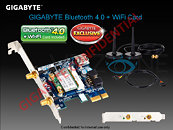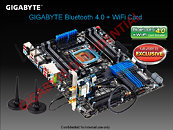Thursday, November 3rd 2011

Gigabyte to Pack Wireless-N and Bluetooth 4.0 Addon Card with Some X79 Boards
There sure is going to be fierce competition between motherboard vendors once "Sandy Bridge-E" Core i7 processors come out, a little later this month. Even the tiniest edge over competitors in terms of features can go a long way with market success. Gigabyte is ready with one such feature of its own: the Bluetooth 4.0 + WiFi b/g/n card, which it will bundle with the GA-X79-UD5, GA-X79-UD7(OC), and G1.Assassin 2. Simply put, this is a special addon card that will provide a Wireless b/g/n (wireless n at 150 Mbps), and Bluetooth 4.0 (24 Mbps) connectivity.
Here's how it works: the card sits on one of the board's PCI-Express x1 slots (or any PCIe slot for that matter), the PCIe connection is wired to the wireless network controller on the mini-PCIe card. We expect this to be a common Atheros AR9285-based card. The main card also has a Bluetooth 4.0 controller, which connects to the system using USB 2.0. A cable runs from the card to any of the board's USB 2.0 front-panel headers. The Bluetooth controller only uses one port, so the other is wired out as an internal USB 2.0 port (good for any DRM dongles you may have). The card is then wired to two antennas (included), one for the wireless network controller, the other for the Bluetooth, both have activity LEDs. It's not known if Gigabyte will sell this card separately, so just about anyone can use it.
Source:
VR-Zone
Here's how it works: the card sits on one of the board's PCI-Express x1 slots (or any PCIe slot for that matter), the PCIe connection is wired to the wireless network controller on the mini-PCIe card. We expect this to be a common Atheros AR9285-based card. The main card also has a Bluetooth 4.0 controller, which connects to the system using USB 2.0. A cable runs from the card to any of the board's USB 2.0 front-panel headers. The Bluetooth controller only uses one port, so the other is wired out as an internal USB 2.0 port (good for any DRM dongles you may have). The card is then wired to two antennas (included), one for the wireless network controller, the other for the Bluetooth, both have activity LEDs. It's not known if Gigabyte will sell this card separately, so just about anyone can use it.


9 Comments on Gigabyte to Pack Wireless-N and Bluetooth 4.0 Addon Card with Some X79 Boards
just 150Mbps? external antennas(on a cable)? usb header needed for bluetooth?
no offense but I would rather not bother with it
/end mini rant
more is better but also quality over quantity :D
The USB cable is required unless you add a USB 2.0 host controller to the PCI Express adapter, as there are no PCI Express Bluetooth chips.
As for 150Mbps, yeah, that part kinda sucks, but in all fairness, no other motherboard maker offers anything better.
Also, I'd rather have this than Asus proprietary module that fits one, yes one, of their motherboards, or the nasty solution from ECS with a wire attached to a PCB antenna which is connected to the rear of the USB dongle which is part of the I/O ports, but hey...
Enthusiasts know enough to choose two or three stream N instead of this halfhearted solution.
*also, no 5GHz.
i didnt even realise they'd passed TWO
4.0 is low power and meant for sensors and all sorts of crap like home automation and what not.
en.wikipedia.org/wiki/Bluetooth#Bluetooth_v3.0_.2B_HS